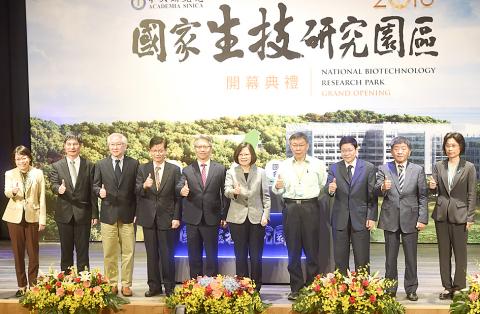President Tsai Ing-wen (蔡英文) yesterday inaugurated the National Biotechnology Research Park in Taipei’s Nangang District (南港), saying its opening marks a giant step in the development of the nation’s biotech industry.
The park houses the Ministry of Health and Welfare’s Food and Drug Administration, the Ministry of Science and Technology’s National Laboratory Animal Center, the Ministry of Economic Affairs’ Development Center for Biotechnology, an incubation center, two Academia Sinica research centers and a bioinformatics center.
While some of the agencies moved in last year, the park’s inauguration had been put off several times.

Photo: Chien Jung-fong, Taipei Times
With Academia Sinica leading the project and a budget of more than NT$20 billion (US$646.4 million), the park was set up on a site that used to house the Ministry of National Defense’s 202nd Arsenal.
“Taiwan’s essential competitiveness in the next generation will stem from the biotech and biomedical industries,” Tsai said in her speech at the opening, expressing her hope that the park would be connected with the Hsinchu Biomedical Science Park to form an industrial corridor.
Aided by the passage of amendments to the Fundamental Science and Technology Act (科學技術基本法) and the Act for the Development of Biotech and New Pharmaceuticals Industry (生技新藥產業發展條例) last year, the nation’s biotech industry should be able to attract more talented people, she said.
The project had been overseen by three former presidents — Lee Teng-hui (李登輝), Chen Shui-bian (陳水扁) and Ma Ying-jeou (馬英九) — as well as Tsai and Vice President Chen Chien-jen (陳建仁), Academia Sinica President James Liao (廖俊智) said, adding that two of the institute’s former presidents, Lee Yuan-tseh (李遠哲) and Wong Chi-huey (翁啟惠), also provided vital contributions.
Given environmental groups’ concern over the project’s potential impact on local species, the institution has restricted buildings to 3 hectares, while maintaining a 4-hectare ecological pool and reserving the rest for ecological restoration, Liao said.
The park is to be managed by a cross-agency committee, with Academia Sinica academician Andrew Wang (王惠鈞) serving as acting chief executive and National Taiwan University animal science professor Ding Shih-torng (丁詩同), who is also the director of the park’s incubation center, as its acting deputy executive.

‘TAIWAN-FRIENDLY’: The last time the Web site fact sheet removed the lines on the US not supporting Taiwanese independence was during the Biden administration in 2022 The US Department of State has removed a statement on its Web site that it does not support Taiwanese independence, among changes that the Taiwanese government praised yesterday as supporting Taiwan. The Taiwan-US relations fact sheet, produced by the department’s Bureau of East Asian and Pacific Affairs, previously stated that the US opposes “any unilateral changes to the status quo from either side; we do not support Taiwan independence; and we expect cross-strait differences to be resolved by peaceful means.” In the updated version published on Thursday, the line stating that the US does not support Taiwanese independence had been removed. The updated

‘CORRECT IDENTIFICATION’: Beginning in May, Taiwanese married to Japanese can register their home country as Taiwan in their spouse’s family record, ‘Nikkei Asia’ said The government yesterday thanked Japan for revising rules that would allow Taiwanese nationals married to Japanese citizens to list their home country as “Taiwan” in the official family record database. At present, Taiwanese have to select “China.” Minister of Foreign Affairs Lin Chia-lung (林佳龍) said the new rule, set to be implemented in May, would now “correctly” identify Taiwanese in Japan and help protect their rights, the Ministry of Foreign Affairs said in a statement. The statement was released after Nikkei Asia reported the new policy earlier yesterday. The name and nationality of a non-Japanese person marrying a Japanese national is added to the

AT RISK: The council reiterated that people should seriously consider the necessity of visiting China, after Beijing passed 22 guidelines to punish ‘die-hard’ separatists The Mainland Affairs Council (MAC) has since Jan. 1 last year received 65 petitions regarding Taiwanese who were interrogated or detained in China, MAC Minister Chiu Chui-cheng (邱垂正) said yesterday. Fifty-two either went missing or had their personal freedoms restricted, with some put in criminal detention, while 13 were interrogated and temporarily detained, he said in a radio interview. On June 21 last year, China announced 22 guidelines to punish “die-hard Taiwanese independence separatists,” allowing Chinese courts to try people in absentia. The guidelines are uncivilized and inhumane, allowing Beijing to seize assets and issue the death penalty, with no regard for potential

‘UNITED FRONT’ FRONTS: Barring contact with Huaqiao and Jinan universities is needed to stop China targeting Taiwanese students, the education minister said Taiwan has blacklisted two Chinese universities from conducting academic exchange programs in the nation after reports that the institutes are arms of Beijing’s United Front Work Department, Minister of Education Cheng Ying-yao (鄭英耀) said in an exclusive interview with the Chinese-language Liberty Times (the Taipei Times’ sister paper) published yesterday. China’s Huaqiao University in Xiamen and Quanzhou, as well as Jinan University in Guangzhou, which have 600 and 1,500 Taiwanese on their rolls respectively, are under direct control of the Chinese government’s political warfare branch, Cheng said, citing reports by national security officials. A comprehensive ban on Taiwanese institutions collaborating or